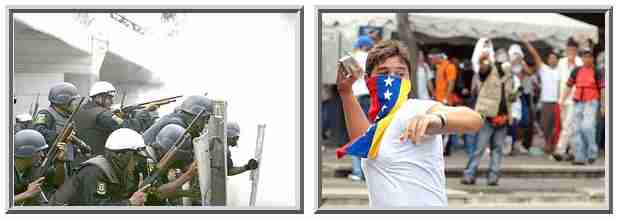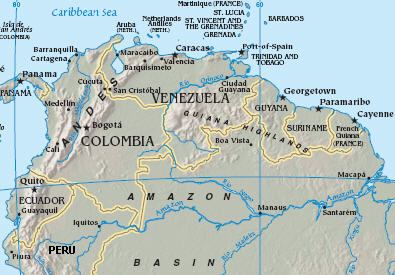
Dynamics

|
Generational Dynamics |
| Forecasting America's Destiny ... and the World's | |
| HOME WEB LOG COUNTRY WIKI COMMENT FORUM DOWNLOADS ABOUT | |
Finally we can see what America in the sixties was like.
If you're old enough to remember America in the 60s and 70s, the pictures below will bring a tear to your eye and a lump to your throat.
These pictures are amazing. I could swear that I remember seeing all these pictures before -- they're so eerily familiar -- but I saw them as a student in the 60s and 70s.
But the pictures aren't from America in the 60s; they're from Venezuela, and they're captured from video taken in the last two days.
Now you can really see why I say that the so-called "antiwar movement" of today so anemic and pathetic that there really isn't an antiwar movement. I'll come back to that later, but let's get to the pictures.
 |
 |
 |
 |
 |
 |
Venezuela's last crisis war was shared with Colombia, where most of the genocide and destruction took place. It took place from 1948-58, and was known as "La Violencia," or the Colombian Revolt. More than 200,000 persons lost their lives and more than a billion dollars of property damage was done.
The kinds of political demonstrations you're seeing in Venezuela are performed by the generation born after the end of the last crisis war. I've explained what happens many times, so I'll only summarize it.
The survivors of a generational crisis war are so traumatized by the war that they vow to do everything they can to make sure that their children and grandchildren never have to go through the same thing. They create institutions and rules designed to make sure of this.
The generation born after the end of the war grow up feeling oppressed by these institutions and rules. When they grow up, around 20 years past the end of the crisis war, they rebel against their parents and the onerous institutions and rules. This is known as a generational "Awakening era," like America in the 1960s-70s. The young kids in the post-war generation and rebel against them, creating a "generation gap" with their parents.
America's last crisis war was World War II, so you saw massive student demonstrations in the 1960s and 1970s. What people have so much difficulty understanding is that it's ONLY THE ONE POST-WAR GENERATION, the Boomers in the case of America, and NO OTHER GENERATION, that perform these massive demonstrations. See my article, Why aren't college students protesting against the Iraq war?
For the past five years, politicians and journalists have been scratching their heads, wondering why college kids are aren't protesting against the Iraq war. The reason is: THEY AREN'T BOOMERS. In fact, you sometimes see something demonstrators like "Grannies against the war." These grannies are exactly the same women who were burning their bras and protesting against the Vietnam war when they were 40 years younger.
So now let's turn to Venezuela. 49 years have passed since the end of the last crisis war, so that Venezuela is past the end of its generational Awakening era, and in its generational Unraveling era.
I mention 49 years particularly because of something I heard several times in the news coverage of the Venezuela protests: Several reporters made the point that there were more than students participating in the demonstrations -- that older people in their thirties and forties were also demonstrating. The conclusion they drew from this was that the demonstrations were more serious than if just students were demonstrating. I heard this same thing several times.
But that's not necessarily the case. Of course some of the demonstrators were older -- they're in the post-war generation born after 1958, so some of the demonstrators are going to be older. From the point of view of generational theory, the older demonstrators will only want to pursue a political struggle; however, some of the younger demonstrators -- that is, the students (who correspond to America's Generation-X) -- may be more inclined to low level violence. We'll have to wait and seen how it rolls out.
The event that triggered the demonstrations was the decision by nutcake President Hugo Chávez to shut down a popular TV station which has supported Chávez' opposition. This has prompted cries of censorship, and angered a lot of people.
The best thing that Chávez could do is to allow the opposition TV station to continue broadcasting, and then try to close it down again in a year or so, when the demonstrations might well be much smaller.
However, if Chávez overreacts, as it appears he's already doing, then the demonstrations are likely to grow.
There are two recent historical examples that the current situation can be compared with, because they're demonstrations that occurred roughly at the end of the Awakening era.
One is the 1989 Tiananmen Square massacre in China. In that case, a violent overreaction by the Chinese authorities did succeed in dispersing the crowd, but was an enormous shock to China, and resulted in the Falun Gong dissident movement that threatens the stability of China at the present time.
The second comparable example is the Kwangju massacre of 1980 in South Korea. In the case of China, the "old generation" won; in South Korea, the "young generation" won, and it's that younger generation that's in power today in a scandal-ridden administration that's way over its head in dealing with the North Korean threat.
These two examples -- China's Tiananmen Square massacre and South Korea's Kwangju massacre -- illustrate some of the range of possible scenarios that can follow a harsh crackdown by Hugo Chávez. We'll have to watch in the next few weeks to see what happens.
One of the things that I mention from time to time on this web site
is Schadenfreude: taking pleasure
from someone else's misfortune. For those of us who don't like Hugo
Chávez, it's a joy to watch his chagrin as he looks out his window and
sees his "revolution" being challenged by thousands of
counter-revolutionary students.
(30-May-07)
Permanent Link
Receive daily World View columns by e-mail
Donate to Generational Dynamics via PayPal
Web Log Summary - 2016
Web Log Summary - 2015
Web Log Summary - 2014
Web Log Summary - 2013
Web Log Summary - 2012
Web Log Summary - 2011
Web Log Summary - 2010
Web Log Summary - 2009
Web Log Summary - 2008
Web Log Summary - 2007
Web Log Summary - 2006
Web Log Summary - 2005
Web Log Summary - 2004
Web Log - December, 2016
Web Log - November, 2016
Web Log - October, 2016
Web Log - September, 2016
Web Log - August, 2016
Web Log - July, 2016
Web Log - June, 2016
Web Log - May, 2016
Web Log - April, 2016
Web Log - March, 2016
Web Log - February, 2016
Web Log - January, 2016
Web Log - December, 2015
Web Log - November, 2015
Web Log - October, 2015
Web Log - September, 2015
Web Log - August, 2015
Web Log - July, 2015
Web Log - June, 2015
Web Log - May, 2015
Web Log - April, 2015
Web Log - March, 2015
Web Log - February, 2015
Web Log - January, 2015
Web Log - December, 2014
Web Log - November, 2014
Web Log - October, 2014
Web Log - September, 2014
Web Log - August, 2014
Web Log - July, 2014
Web Log - June, 2014
Web Log - May, 2014
Web Log - April, 2014
Web Log - March, 2014
Web Log - February, 2014
Web Log - January, 2014
Web Log - December, 2013
Web Log - November, 2013
Web Log - October, 2013
Web Log - September, 2013
Web Log - August, 2013
Web Log - July, 2013
Web Log - June, 2013
Web Log - May, 2013
Web Log - April, 2013
Web Log - March, 2013
Web Log - February, 2013
Web Log - January, 2013
Web Log - December, 2012
Web Log - November, 2012
Web Log - October, 2012
Web Log - September, 2012
Web Log - August, 2012
Web Log - July, 2012
Web Log - June, 2012
Web Log - May, 2012
Web Log - April, 2012
Web Log - March, 2012
Web Log - February, 2012
Web Log - January, 2012
Web Log - December, 2011
Web Log - November, 2011
Web Log - October, 2011
Web Log - September, 2011
Web Log - August, 2011
Web Log - July, 2011
Web Log - June, 2011
Web Log - May, 2011
Web Log - April, 2011
Web Log - March, 2011
Web Log - February, 2011
Web Log - January, 2011
Web Log - December, 2010
Web Log - November, 2010
Web Log - October, 2010
Web Log - September, 2010
Web Log - August, 2010
Web Log - July, 2010
Web Log - June, 2010
Web Log - May, 2010
Web Log - April, 2010
Web Log - March, 2010
Web Log - February, 2010
Web Log - January, 2010
Web Log - December, 2009
Web Log - November, 2009
Web Log - October, 2009
Web Log - September, 2009
Web Log - August, 2009
Web Log - July, 2009
Web Log - June, 2009
Web Log - May, 2009
Web Log - April, 2009
Web Log - March, 2009
Web Log - February, 2009
Web Log - January, 2009
Web Log - December, 2008
Web Log - November, 2008
Web Log - October, 2008
Web Log - September, 2008
Web Log - August, 2008
Web Log - July, 2008
Web Log - June, 2008
Web Log - May, 2008
Web Log - April, 2008
Web Log - March, 2008
Web Log - February, 2008
Web Log - January, 2008
Web Log - December, 2007
Web Log - November, 2007
Web Log - October, 2007
Web Log - September, 2007
Web Log - August, 2007
Web Log - July, 2007
Web Log - June, 2007
Web Log - May, 2007
Web Log - April, 2007
Web Log - March, 2007
Web Log - February, 2007
Web Log - January, 2007
Web Log - December, 2006
Web Log - November, 2006
Web Log - October, 2006
Web Log - September, 2006
Web Log - August, 2006
Web Log - July, 2006
Web Log - June, 2006
Web Log - May, 2006
Web Log - April, 2006
Web Log - March, 2006
Web Log - February, 2006
Web Log - January, 2006
Web Log - December, 2005
Web Log - November, 2005
Web Log - October, 2005
Web Log - September, 2005
Web Log - August, 2005
Web Log - July, 2005
Web Log - June, 2005
Web Log - May, 2005
Web Log - April, 2005
Web Log - March, 2005
Web Log - February, 2005
Web Log - January, 2005
Web Log - December, 2004
Web Log - November, 2004
Web Log - October, 2004
Web Log - September, 2004
Web Log - August, 2004
Web Log - July, 2004
Web Log - June, 2004